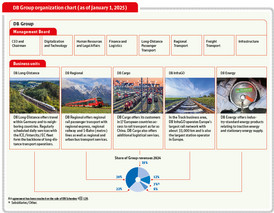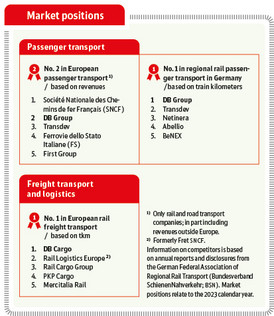Organizational structure

DB AG is the parent company of DB Group. It has been a stock corporation under German law since it was founded in 1994 and accordingly has a dual management and control structure comprising a Management Board and a Supervisory Board. It is wholly owned by the Federal Republic of Germany. Changes in the composition of the Supervisory Board and Management Board are presented in the Supervisory Board report.
DB Group comprises passenger transport activities in Germany, rail freight transport activities, the operating service units and the rail infrastructure companies (RICs).
DB Group is a leading provider of passenger and freight transport. Our national and international services give us leading market positions in our relevant markets. With a length of about 33,000 km, we operate Europe’s longest rail network. We are also one of the largest energy suppliers in Germany.
There were significant changes to DB Group’s major international subsidiaries in 2024:
- The sale of DB Arriva was completed in May 2024.
- The sale of DB Schenker was decided in October 2024 and is expected to be implemented in 2025.

DB Group, headquartered in Berlin, employs about 226,000 people (excluding DB Schenker). DB AG manages all business units as an operating management holding company and supports the business units through various central Group functions (including legal, corporate development, balance sheets, taxes and insurance, as well as finance and treasury) and administrative service units. In addition, operational service units as legally independent subsidiaries of DB AG primarily provide services for intra-Group customers. These include DB Systel GmbH, DB Sicherheit GmbH, DB Services GmbH and DB Kommunikationstechnik GmbH.
DB Group is focusing on a shift in the mode of transport to rail with its Strong Rail strategy. To this end, we rely on integrated operation of transport and rail infrastructure, the economically and environmentally intelligent linkage of all modes of transport, as well as cooperation in German and European networks. As a prerequisite for the further shift in the mode of transport to rail, the highest priority is to increase operating quality with a view to increasing capacity.
One step towards achieving these goals was the bundling of the infrastructure business areas in the common good-oriented infrastructure company DB InfraGO. DB InfraGO AG is part of DB Group.
The train operating companies (TOCs) in DB Group are legally independent companies with separate balance sheets and statements of income and thus comply with all unbundling requirements under European and national law. There is also a so-called functional unbundling, which guarantees independent decisions by DB InfraGO AG in relation to infrastructure access and fees. Reliability and stability form the basis of a high-quality infrastructure. The key cornerstone of profitable business is the sustainable financing of infrastructure. The Performance and Financing Agreement (Leistungs- und Finanzierungsvereinbarung; LuFV) makes a significant contribution to ensuring that the existing network is maintained. The LuFV is to be further developed into the InfraGO Performance Agreement (LV InfraGO).